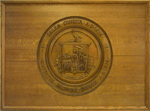Pickman-Derby mansion: Difference between revisions
No edit summary |
No edit summary |
||
| Line 15: | Line 15: | ||
*"The Ups and Downs of Saving Buildings" ''Salem Evening News'', Mar. 29, 2000, p. A2 | *"The Ups and Downs of Saving Buildings" ''Salem Evening News'', Mar. 29, 2000, p. A2 | ||
*[http:// | *[http://evergreen.noblenet.org/eg/opac/record/1210825?locg=63 Visitor's Guide to Salem] 1953 ed., p. 47, 168-69 | ||
*[http:// | *[http://evergreen.noblenet.org/eg/opac/record/2009145?locg=63 Colonial Architecture of Salem] F. Cousins and P. Riley, p. 61,179 (''photo p. 58'') | ||
Revision as of 10:24, 16 January 2013
The Pickman-Derby mansion was built in 1764 on the corner of Washington and Lynde Streets. Originally built for Benjamin Pickman Jr. After Elias Hasket Derby bought the house in 1786 he hired Samuel McIntire to renovate it. McIntire added a cupola and the ceiling was painted with a fresco by Salem artist Michele Corne depicting Derby's ships.
Another Salem artist, John Rogers who later became nationally known for his statuary, was born in the house in 1829.
The mansion was torn down in 1915 and replaced by the Masonic Temple. The McIntire cupola with its carved eagle was removed and placed in the garden at the Essex Institute where it remained until the 1970's. At that time the cupola was found to be infested with beetles and it had to be destroyed. The mural painting by Corne was salvaged and installed in the museum entrance to the garden cafe.
See Also
- The Ups and Downs of Saving Buildings Salem Tales, Salem Web site
- "The Ups and Downs of Saving Buildings" Salem Evening News, Mar. 29, 2000, p. A2
- Visitor's Guide to Salem 1953 ed., p. 47, 168-69
- Colonial Architecture of Salem F. Cousins and P. Riley, p. 61,179 (photo p. 58)
